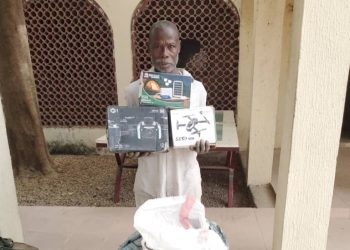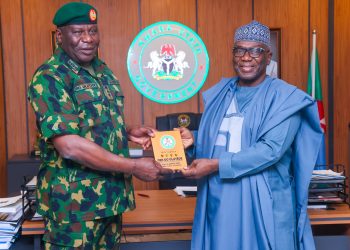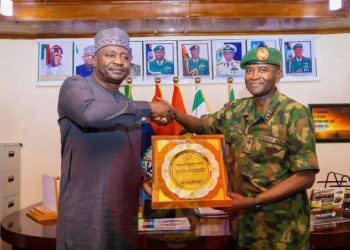By Nkechi Eze
The Defence Headquarters (DHQ) has rejected a recent report released by Amnesty International titled “Nigeria: Mounting death toll and looming humanitarian crisis amid unchecked attacks by armed groups,” describing the document as misleading, lacking context, and grossly underestimating the substantial gains recorded by the Armed Forces of Nigeria (AFN) under the current administration.
In an official signed statement by the Director, Defence Media Operations, Major General Markus Kangye, the DHQ acknowledged the critical role civil society organizations play in accountability and human rights advocacy. However, it registered strong objections to what it called “sweeping generalizations, lack of contextual depth, and the failure of the statement to recognize the monumental strides made by the Armed Forces of Nigeria under the current administration.”
The DHQ noted that the Amnesty report presents a distorted narrative by painting a “bleak and generalized picture of national insecurity,” ignoring the complex and evolving nature of modern asymmetric threats, many of which are deeply rooted in long-standing socio-political and economic challenges. It maintained that, contrary to the implications of the report, the military has been neither absent nor inactive in the face of these threats.
Since President Bola Ahmed Tinubu assumed office in May 2023, the military, operating under the renewed strategic direction of the Commander-in-Chief, has achieved significant milestones. According to the statement, over 5,000 insurgents and bandits have been neutralized across the Northeast, Northwest, and North Central regions. Dozens of high-value terrorist commanders have been eliminated through precision airstrikes and intelligence-driven ground operations.
The Armed Forces have also successfully recovered over 350 communities and villages from the control of terrorists and bandits. Key locations such as Maru in Zamfara, Bokkos in Plateau, and Logo in Benue have witnessed the return of displaced persons under military protection, as civil authority is being gradually restored.
In terms of hostage recovery, the military reported the rescue of over 1,200 abducted civilians, including women and children, many of whom were victims of mass abductions. Several kidnapping syndicates have been dismantled and weekly recoveries of illegal weapons continue across multiple theatres.
Highlighting improved civil-military cooperation, the DHQ outlined the deployment of Quick Response Forces (QRFs), establishment of forward operating bases, and greater coordination with state governments and community leaders. Ongoing operations such as Operation SAFE HAVEN, Operation HADARIN DAJI, and Operation WHIRL STROKE have played pivotal roles in suppressing militia activities and inter-communal violence.
The statement also pointed to advancements in air power and surveillance. The Nigerian Air Force has executed over 500 successful air interdictions and close air support missions, significantly disrupting the movement and logistics of armed groups. The integration of modern surveillance drones and night operations has enhanced tactical superiority and reduced civilian casualties.
On border integrity and critical asset protection, the military engineering corps have secured and rehabilitated key transport and communication corridors previously vulnerable to attacks. Additionally, increased joint patrols along porous borders with Cameroon, Niger, and Chad have helped curtail cross-border infiltration, although recent political developments in the Sahel region are posing fresh challenges.
Addressing Amnesty International’s statistics, DHQ challenged the report’s credibility, particularly its claim that 10,217 people were killed between 29 May 2023 and 29 May 2025, including 2,630 in Plateau State alone. The military described these figures as exaggerated and misleading. It stated that since the reorganization of deployments in Plateau State in July 2023 and the commencement of broad-spectrum subsidiary operations, the region experienced considerable improvement in security. Only two major coordinated attacks were recorded on Christmas Eve 2023 and in Bokkos and Bassa LGAs in April 2025, contrary to Amnesty’s claims.
DHQ flatly denied the report’s claim of 167 displaced communities in Plateau State over the last two years. It noted that while the region experienced displacement in 2011, there have been no further displacements between 2023 and 2025. Rather, the Plateau State Government convened a committee in 2024 to facilitate the resettlement of previously displaced persons, with arrangements for their return ongoing.
On the Northwest region, DHQ observed that Amnesty International’s assertions regarding Sokoto, Zamfara, Kebbi, and Katsina States were exaggerated and failed to account for the ground realities and ongoing counter-efforts. While the report acknowledged the complexity of the challenges in the region, it did not adequately reflect the military’s sacrifices, countermeasures, or operational successes.
In Zamfara State, DHQ countered the claim that 481 villages were sacked and 529 were under bandit control. It said those figures were unverified and exaggerated, pointing out that military presence has been actively sustained across the state. The attack on the mining site at Gobirawar Chali, it said, was swiftly responded to with ground pursuit and aerial surveillance. Over the last 24 months, troops have neutralized more than 47 bandit kingpins and conducted over 2,000 deliberate offensive operations. These have led to the rescue of 687 abductees, recovery of stolen livestock, destruction of hundreds of bandit camps, and arrest of over 200 collaborators.
In Sokoto State, DHQ dismissed Amnesty’s claim that villages like Bafarawa, Gebe, and Kamarawa were left without protection. It affirmed that 8 Division of the Nigerian Army operates forward operating bases within 10 to 15 kilometers of those communities. From 13 to 19 May 2025, troops carried out joint operations that cleared bandit enclaves in Isa and Sabon Birni LGAs. The terrorist group referred to as “Lakurawa” is currently being targeted through intelligence-led operations. Troops continue to conduct deliberate offensive operations, patrols, and cordon-and-search missions in the state.
In Kebbi State, DHQ refuted the report’s claim that 70 people were killed in 22 attacks. Military records showed only 11 major incidents from May 2024 to May 2025. Troops deployed in Danko-Wasagu and Fakai LGAs have been reinforced with mobile forces, and offensive operations continue to be launched regularly. Surveillance and operational dominance along the Niger-Kebbi border have also been enhanced to prevent cross-border arms trafficking.
The situation in Katsina State was also addressed. DHQ confirmed that attacks have significantly declined due to improved intelligence gathering, increased patrols, and targeted ambush operations. On 23 May 2025 alone, 21 bandits were neutralized during an offensive in Ruwan Godiya community. Security forces also arrested 77 collaborators and informants aiding bandit logistics in Faskari, Batsari, and Dan Musa LGAs. Continuous 24/7 patrols, civil-military town hall meetings, and local vigilante support have further contributed to stabilizing the area.
DHQ also responded to allegations of impunity within the military. It asserted that erring personnel are regularly prosecuted through court-martials, and headquarters of 8 Division has established report desks and emergency numbers to promote transparency. All reported cases are investigated, and suspects or collaborators are handed over to the DSS, Nigeria Police, or relevant civil authorities.
Addressing the situation in Benue State, the DHQ described as false Amnesty’s claim that over 6,896 people were killed and 148 villages sacked, with 450,000 people displaced. According to military records, only 693 people were killed including 23 military personnel within the period in review. The statement emphasized that only seven LGAs, including Ukum, Logo, Katsina-Ala, Gwer West, Gwer East, Apa, and Agatu, are hotspots, while the remaining 15 LGAs in the state remain relatively peaceful. DHQ also clarified that most IDP camps in the state are nearly empty and only experience increased population during anticipated distribution of relief materials.
In its conclusion, DHQ accused Amnesty International of disseminating “wrong feedbacks, factual errors, and misinformation,” which it warned could erode public trust and incite negative sentiments. “The Nigerian Armed Forces remain committed to protecting all citizens, restoring peace, and safeguarding the territorial integrity of the nation,” the statement read.
Major General Kangye reaffirmed the military’s adherence to human rights and international humanitarian law, stating that all allegations of misconduct are thoroughly investigated. He, however, cautioned that it is “unacceptable to generalize isolated failures or lapses as institutional policy.”
While the DHQ expressed readiness to engage constructively with relevant stakeholders, it urged Amnesty International to avoid disinformation and instead collaborate more meaningfully in developing nuanced, data-driven assessments that reflect ongoing realities and support national security and humanitarian goals.














